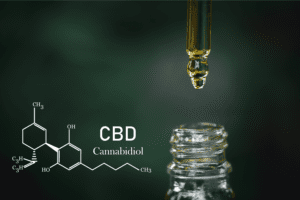Your Cart Details
By Angela Queen | Jan 19, 2024
THC Vs CBD for Sleep
THC Vs CBD for Sleep
By Angela Queen | Jan 19, 2024
THC vs CBD for sleep, are you confused about which one to choose? Navigating the realm of cannabinoids in pursuit of a good night’s sleep often leads to a comparison between two prominent compounds: CBD (cannabidiol) and THC (tetrahydrocannabinol). While both are derived from the cannabis plant, their effects on sleep diverge significantly.
In this article, we explore the distinctions between CBD and THC, shedding light on how each compound interacts with the body and influences sleep patterns. Whether you’re seeking relaxation without intoxication or exploring the potential benefits of a more comprehensive cannabis experience, join us as we compare CBD and THC in the context of sleep, helping you make an informed decision tailored to your individual needs.
Understanding the Cannabinoids THC and CBD
What is a Cannabinoid?
Cannabinoids are chemical compounds that are found in the Cannabis sativa plant. These compounds interact with the endocannabinoid system (ECS) in the bodies of humans and other mammals. The ECS plays a crucial role in regulating various physiological processes, including mood, appetite, sleep, immune response, and pain sensation.
The two primary types of cannabinoids are endocannabinoids and phytocannabinoids:
- Endocannabinoids: These are naturally occurring cannabinoids produced within the body. Anandamide and 2-arachidonoylglycerol (2-AG) are two well-known endocannabinoids.
- Phytocannabinoids: These cannabinoids are found in plants, with the highest concentrations typically found in the cannabis plant. The most well-known phytocannabinoids include THC (tetrahydrocannabinol) and CBD (cannabidiol), but there are over 100 different cannabinoids identified in cannabis.
Cannabinoids interact with receptors in the ECS, known as CB1 and CB2 receptors, to modulate the release of neurotransmitters and maintain balance in various physiological functions. The activation of these receptors influences processes such as pain perception, immune response, and mood.
THC Vs CBD for Sleep
The Drawbacks of THC for Sleep
While THC (tetrahydrocannabinol) is known for its psychoactive effects and potential therapeutic benefits, there are drawbacks associated with its use, particularly in the context of sleep. It is imperative to note that these drawbacks are based on THC amounts that are higher than the federal limit of 0.3% found in CBD/THC products, and in balance cannabinoids work together to offset negative impacts. This is why many consumers prefer Full-Spectrum products that contain a variety of cannabinoids. Learn more about Full-Spectrum Vs. Broad Spectrum.
Here are some potential drawbacks of THC for sleep:
- Disruption of Sleep Architecture: THC has been shown to alter sleep architecture, the natural pattern of sleep stages. While it may initially help users fall asleep faster, it can lead to disruptions in the sleep cycle, including a reduction in REM (rapid eye movement) sleep. REM sleep is crucial for cognitive function and emotional well-being, and disturbances in this stage may impact the overall quality of sleep.
- Daytime Sleepiness and Impairment: Some individuals may experience residual sedation and grogginess the morning after using THC, which can interfere with daytime alertness and performance. This can be particularly problematic for individuals who need to be alert and focused during the day.
- Tolerance and Dependence: Regular use of THC can lead to the development of tolerance, meaning that over time, higher doses are needed to achieve the same sleep-inducing effects. Additionally, dependence or addiction can occur in some individuals, leading to difficulties in discontinuing or reducing THC use.
- Potential for Anxiety and Paranoia: THC is known to have psychotropic effects, and in some individuals, it can lead to increased anxiety and paranoia. These psychological effects can be counterproductive for individuals seeking relaxation and stress relief before sleep.
- Interference with REM Rebound: When THC is discontinued after regular use, there may be a rebound effect on REM sleep. This means that the body may compensate for the suppressed REM sleep during THC use by increasing REM sleep when THC is no longer present. This rebound effect can result in vivid dreams and disturbances in sleep patterns.
- Impact on Sleep Disorders: While THC may have potential benefits for certain sleep disorders, such as insomnia, it may not be suitable for everyone. Individuals with sleep disorders such as sleep apnea may experience worsened symptoms with THC use. Additionally, it may not be advisable for individuals with certain psychiatric conditions.
- Legal and Regulatory Considerations: The legal status of THC varies globally and within different jurisdictions. In some places, THC is strictly regulated or prohibited, which can pose legal risks for individuals using it as a sleep aid.
- Cognitive Impairment: THC can impair cognitive function, including memory and attention. Chronic use may have long-term cognitive effects, and these impairments can impact daily functioning and overall well-being.
The Benefits of CBD for Sleep
CBD (cannabidiol) has gained attention for its potential therapeutic effects, including its use as a sleep aid. While research is ongoing, several potential benefits of CBD for sleep have been identified based on available studies and anecdotal evidence. Here are some of the potential benefits of CBD for sleep:
- Reduction in Anxiety and Stress: CBD has been studied for its anxiolytic (anti-anxiety) properties. Anxiety and stress are common contributors to sleep disturbances, and by reducing these factors, CBD may indirectly promote better sleep. Some studies suggest that CBD may influence neurotransmitters such as serotonin, which plays a role in mood regulation.
- Improved Sleep Onset: CBD may help reduce the time it takes to fall asleep, known as sleep onset latency. By interacting with receptors in the endocannabinoid system, CBD may contribute to relaxation, making it easier for individuals to transition into sleep.
- Pain Relief and Comfort: Chronic pain can interfere with sleep, making it difficult for individuals to find a comfortable sleeping position. CBD has been investigated for its potential analgesic (pain-relieving) effects, and by reducing pain and discomfort, it may contribute to improved sleep quality.
- Regulation of Sleep-Wake Cycle: The endocannabinoid system is involved in the regulation of the sleep-wake cycle. CBD’s interaction with this system may help regulate circadian rhythms, promoting a more consistent sleep-wake cycle and better overall sleep patterns.
- REM Sleep Behavior Disorder: Some research suggests that CBD may be beneficial for individuals with REM sleep behavior disorder, a condition in which a person physically acts out vivid dreams during REM sleep. By potentially reducing the occurrence of REM sleep disturbances, CBD may contribute to better overall sleep quality.
- Non-Habit Forming: Unlike some traditional sleep medications, CBD is generally considered non-habit forming. This means that individuals using CBD for sleep are less likely to develop dependence or experience withdrawal symptoms when discontinuing its use.
- Potential for Fewer Side Effects: While individual responses to CBD can vary, it is generally considered to have a favorable side effect profile compared to some pharmaceutical sleep aids. Common side effects of CBD are mild and may include drowsiness, dry mouth, or changes in appetite.
- Versatility in Delivery Methods: CBD is available in various forms, including oils, capsules, edibles, and topicals. This versatility allows individuals to choose a delivery method that aligns with their preferences and needs. For example, sublingual administration (under the tongue) of CBD oil may provide faster effects compared to edibles.
- Promotion of Relaxation: CBD may have a calming effect on the nervous system, promoting relaxation and a sense of tranquility. This relaxation can be conducive to a more restful sleep experience.
Potential Synergies and Combinations
The potential synergies and combinations of THC and CBD for sleep involve exploring nuanced ratios and personalized approaches to harness the benefits of both cannabinoids. Some individuals may find that a balanced blend of THC and CBD, tailored to their specific needs, provides a more comprehensive sleep solution. Understanding the interactions between these cannabinoids and their potential synergistic effects is a key aspect of optimizing sleep support.
Combining with Other Sleep Aids
Combining THC and CBD with other non-cannabinoid sleep aids or natural supplements may offer a synergistic effect. For example, incorporating cannabinoids with melatonin, herbal teas, or relaxation techniques could enhance the overall sleep-promoting effects. However, it’s essential to approach combinations cautiously and consult with healthcare professionals to mitigate potential risks and interactions.
Closing Thoughts on THC Vs CBD for Sleep
In conclusion, the choice between THC and CBD, or a combination of both, for sleep is highly individualized. While THC may have initial sedative effects, it comes with psychoactive properties that may not be suitable for everyone. CBD, on the other hand, offers a non-psychoactive alternative with potential anxiolytic and relaxing effects.
The evolving landscape of cannabinoid research and the increasing availability of diverse products offer individuals the opportunity to explore various formulations and delivery methods. However, the key to optimizing sleep support lies in informed decision-making, cautious experimentation, and a holistic approach to wellness. Whether one chooses THC, CBD, or a combination, integrating good sleep hygiene practices and addressing lifestyle factors remain foundational elements in achieving restorative and rejuvenating sleep. As the science behind cannabinoids continues to advance, individuals are encouraged to stay informed, seek professional advice, and tailor their approach to sleep enhancement based on their unique needs and preferences.



